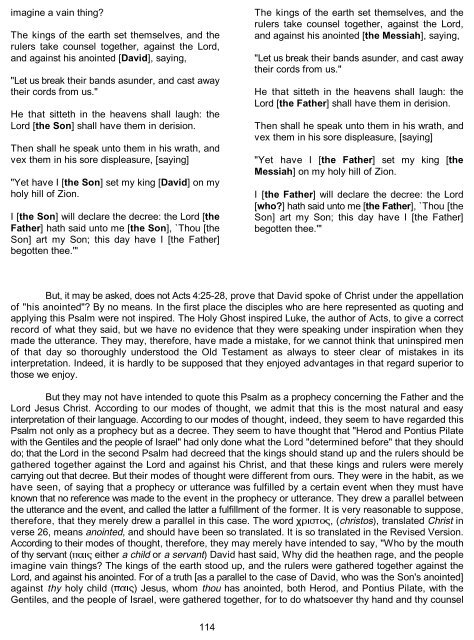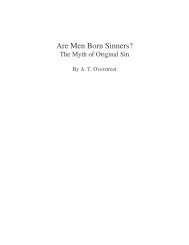Foreknowledge by Joel Hayes - Library of Theology
Foreknowledge by Joel Hayes - Library of Theology
Foreknowledge by Joel Hayes - Library of Theology
Create successful ePaper yourself
Turn your PDF publications into a flip-book with our unique Google optimized e-Paper software.
imagine a vain thing? The kings <strong>of</strong> the earth set themselves, and the<br />
The kings <strong>of</strong> the earth set themselves, and the<br />
rulers take counsel together, against the Lord,<br />
"Yet have I [the Son] set my king [David] on my<br />
holy hill <strong>of</strong> Zion.<br />
I [the Son] will declare the decree: the Lord [the<br />
Father] hath said unto me [the Son], `Thou [the<br />
Son] art my Son; this day have I [the Father]<br />
begotten thee.'"<br />
114<br />
rulers take counsel together, against the Lord,<br />
and against his anointed [the Messiah], saying,<br />
and against his anointed [David], saying, "Let us break their bands asunder, and cast away<br />
their cords from us."<br />
"Let us break their bands asunder, and cast away<br />
their cords from us." He that sitteth in the heavens shall laugh: the<br />
Lord [the Father] shall have them in derision.<br />
He that sitteth in the heavens shall laugh: the<br />
Lord [the Son] shall have them in derision. Then shall he speak unto them in his wrath, and<br />
vex them in his sore displeasure, [saying]<br />
Then shall he speak unto them in his wrath, and<br />
vex them in his sore displeasure, [saying]<br />
"Yet have I [the Father] set my king [the<br />
Messiah] on my holy hill <strong>of</strong> Zion.<br />
I [the Father] will declare the decree: the Lord<br />
[who?] hath said unto me [the Father], `Thou [the<br />
Son] art my Son; this day have I [the Father]<br />
begotten thee.'"<br />
But, it may be asked, does not Acts 4:25-28, prove that David spoke <strong>of</strong> Christ under the appellation<br />
<strong>of</strong> "his anointed"? By no means. In the first place the disciples who are here represented as quoting and<br />
applying this Psalm were not inspired. The Holy Ghost inspired Luke, the author <strong>of</strong> Acts, to give a correct<br />
record <strong>of</strong> what they said, but we have no evidence that they were speaking under inspiration when they<br />
made the utterance. They may, therefore, have made a mistake, for we cannot think that uninspired men<br />
<strong>of</strong> that day so thoroughly understood the Old Testament as always to steer clear <strong>of</strong> mistakes in its<br />
interpretation. Indeed, it is hardly to be supposed that they enjoyed advantages in that regard superior to<br />
those we enjoy.<br />
But they may not have intended to quote this Psalm as a prophecy concerning the Father and the<br />
Lord Jesus Christ. According to our modes <strong>of</strong> thought, we admit that this is the most natural and easy<br />
interpretation <strong>of</strong> their language. According to our modes <strong>of</strong> thought, indeed, they seem to have regarded this<br />
Psalm not only as a prophecy but as a decree. They seem to have thought that "Herod and Pontius Pilate<br />
with the Gentiles and the people <strong>of</strong> Israel" had only done what the Lord "determined before" that they should<br />
do; that the Lord in the second Psalm had decreed that the kings should stand up and the rulers should be<br />
gathered together against the Lord and against his Christ, and that these kings and rulers were merely<br />
carrying out that decree. But their modes <strong>of</strong> thought were different from ours. They were in the habit, as we<br />
have seen, <strong>of</strong> saying that a prophecy or utterance was fulfilled <strong>by</strong> a certain event when they must have<br />
known that no reference was made to the event in the prophecy or utterance. They drew a parallel between<br />
the utterance and the event, and called the latter a fulfillment <strong>of</strong> the former. It is very reasonable to suppose,<br />
therefore, that they merely drew a parallel in this case. The word , (christos), translated Christ in<br />
verse 26, means anointed, and should have been so translated. It is so translated in the Revised Version.<br />
According to their modes <strong>of</strong> thought, therefore, they may merely have intended to say, "Who <strong>by</strong> the mouth<br />
<strong>of</strong> thy servant ( either a child or a servant) David hast said, Why did the heathen rage, and the people<br />
imagine vain things? The kings <strong>of</strong> the earth stood up, and the rulers were gathered together against the<br />
Lord, and against his anointed. For <strong>of</strong> a truth [as a parallel to the case <strong>of</strong> David, who was the Son's anointed]<br />
against thy holy child () Jesus, whom thou has anointed, both Herod, and Pontius Pilate, with the<br />
Gentiles, and the people <strong>of</strong> Israel, were gathered together, for to do whatsoever thy hand and thy counsel






